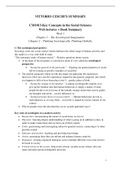VITTORIO CESCHI’S SUMMARY
CM1013-Key Concepts in the Social Sciences
Web lectures + Book Summary
Week 1
Chapter 1 – The Sociological Imagination
Chapter 2 – Thinking Sociologically, Thinking Globally
1) The sociological perspective:
Sociology is the one social science which embraces the whole range of human activities and
this makes it a very wide field of study
“The systematic study of human society” – Relative questions about society
➢ At the heart of the discipline is a distinctive point of view called the sociological
perspective
• “Seeing the general in the particular” – Figuring out general patterns of social
life by looking at specific examples of social life
➢ The general categories which we fall into shape our particular life experiences
(Question: How are your life experiences shaped by the general categories into which
you happen to fall (or have been place) into?) – gender, place of birth…
• “Seeing the strange in the familiar”- Looking sociologically requires us to
give up the familiar idea that human behaviour is simply a matter of what
people decide to do in favour of the initially strange notion that society guides
our thoughts and needs – society influences us
• “Seeing personal choice in social context” – Human behaviours are not as
individualistic as we may think – social life is shaped by factors outside of our
control
➢ Why do people resist the idea that they act in socially patterned ways?
Key roles of sociologists in a modern society:
• Researchers: documenting the nature of social times we live in
• Theorists: fostering deeper understanding of what is going on in addition to data, in
order to make connections and see facts out of their context
• Critic: questioning and interrogating taken-for-granted society, connecting it to other
possible worlds
• Educator and teacher: teaching and providing knowledge
• Artists: generating ideas that can inform and enhance human creativity
• Dialogists: creating organised dialogues across multiple different voices that need to
be heard in society
• Critical citizen in the society: help create critical, socially aware citizen, who can
make informed and knowledgeable decisions
1
,Social marginality: being an outsider of daily living - sociology is an outsider discipline -
the more acute people’s social marginality, the more likely they are to be aware of their
surroundings and to see the world from a different perspective
Benefits of the sociological perspective:
1. Challenging the familiar understandings of ourselves and others: the “taken for
granted” – assessing the truth of commonly held assumptions and realising that that
taken for granted ideas are not always true
2. Enables to assess the opportunities and constraints characterising our lives – See the
patterns, be critical, think for yourself
3. Empowers to be active participants in society – the greater our understanding of the
operation of a society is, the more we can take an active part in shaping social life
4. Recognise human and cultural differences – highlighting both the world’s remarkable
social variety and its suffering, real and potential
Problems with the sociological perspective:
1. Sociology is part of a changing world – society is changing as quickly as we study it!
2. We are part of what we study – We are biased, we tend to think that our behaviours
are right/normal while those of others are not
3. Sociologist’s knowledge becomes part of society – sociologists create ideas that can
shape the way in which societies work
2) Origins and development of sociology
Sociology has to change with society – A big change in European society took place in 18th
and 19th century
Transformation factors that drove the development of sociology in those centuries:
• New industrial economy - Rise of a factory-based economy – New sources of energy
for the operation of large machines → Large factories were being built, usually inside
cities. Workers became part of a large and anonymous work force-Modern Capitalism
• Explosive growth of cities – Rise of population to work in cities, villages were
abandoned – Cities were full and badly organised, lot of pollution, bad working rights
• New ideas about democracy and political rights – Raise of a new political climate in
which key words were individual liberty and rights
• Theory of Gemeinschaft to Gesellschaft (Ferdinand Toennies) – the loss of human
community (gemeinschaft). The Industrial revolution undermined the strong social
fabric of family and tradition by promoting individualism and a business-like
emphasis on facts and efficiency, highlighting self-interest (gesellschaft)
Science and Sociology:
August Comte (1798-1857) is a French social thinker who coined the term “sociology” in
1838 to describe a new way of looking at the world
➢ Father of Positivism: understanding the world based on science (empirical research)
2
, ➢ Before Positivism, religion was answering the question “why and how things are the
way they are?”
Comte saw sociology as the product of three stages of historical development in our
understanding of the world:
Theological stage – everything we see around is God’s will
Metaphysical stage – everything we see around is the result of a natural phenomenon
Scientific/positivist stage – understanding the world based on science/research
The modern society of the last century faced a rapid technological development.
We distinguish different terms to define this rapid change:
• The digital age: highlights the shift from analogue to digital and the computerisation
of life
• The cyborg age: highlights how humans are more and more becoming adapted to live
with all manner of technology
• The information age: highlights the rapid growth of production and availability of all
kinds of data and information
• The network society: highlights the ways in which new ways of communicating and
relating have developed
• The virtual age: highlights the mediated nature of reality – lately, reality is less direct
but mediated through technology
3) Sociological Theory
Theory: A statement of how and why specific facts are related
• Sociological theory tries to explain social behavior in the real world
• Sociologists conduct research to strive for facts which test, refine, confirm or modify
their theories
Basic questions in building a theory:
- What issues should we study?
- How should we connect the facts?
- What assumptions inform our theories? – We need a certain perspective
Theoretical approach/perspective
A basic image of society that guides thinking and research and serves as a roadmap –
sociologists examine the social world by looking at functions and dysfunctions, conflicts and
consensus, actions and meanings.
Three major theoretical perspectives on how society is shaped:
• (Structural) functionalist/Functionalism perspective – nothing happens just
because it happens, everything has a function
➢ Functionalism sees society as a complex system whose parts work
together to promote solidarity and stability
3
, ➢ Focus on social structure – any relatively stable pattern of social
behaviour – those are interdependent and work together to preserve
society
➢ These patterns have social functions – society operates as a whole –
all social structures contributes to the operation of a society
➢ Robert K. Merton (1910-2003) is one of the fathers – he pointed out
that social structure has many functions
➢ Manifest functions: recognised and intended functions/consequences
of a social pattern – i.e. uni’s function is to provide knowledge and
skills to find a good job
➢ Latent functions: consequences that are largely unintended and
unrecognised – i.e. uni gives the opportunity to meet potential partners
➢ Social dysfunctions: any social pattern’s undesirable consequences for
the operation of society – not all effects of any social structure turn out
to be useful
• Conflict perspective – society is the way it is because there’s constant conflict and
contraposition
➢ Karl Marx (1803-1883) is the social thinker whose ideas underlie the
conflict perspective
➢ Sees society as an arena of differences and inequality that generates
conflict and change
➢ Highlights how the following factors are linked to inequality:
o Class, race, ethnicity, gender, age…
➢ This approach is used to look at ongoing conflict between dominant
and disadvantaged categories of people
➢ A conflict analysis points out that, rather than promoting the operation
of a society as a whole, social structure generally benefits some people
while depriving others
• Social action perspective – human action shape society
➢ Focuses on how human actions and social meanings shape society
➢ Is a symbolic-interaction approach – a framework for building
theory that sees society as the product of the everyday interactions of
individuals doing things together
➢ Society is the product of everyday life
o Society is the reality people construct for themselves as
they interact with one another
o Sociologists study social life through life stories and
observations
o Through the human process of finding meaning in our
surroundings, we define our identities, bodies and
feelings, and come to “socially construct” the world
around us
o However, everyone define subjective meanings and
variable responses about the reality that surrounds us
4





